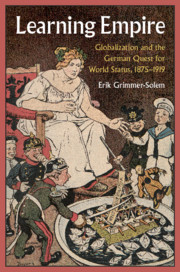Introduction
Published online by Cambridge University Press: 20 September 2019
Summary
This book intervenes into longstanding debates about Imperial Germany's peculiarity linked to its authoritarian traditions, the failure of liberalism, the domestic origins of its overseas imperialism, and its role in the outbreak of the First World War first sparked by the historian Fritz Fischer in the 1960s. It is also informed by debates about liberal imperialism in Britain, France, Germany, and the United States, as well as discussions on the origins of Nazism. The introduction questions Fischer’s interpretation by drawing on recent literature that has revealed the many common features of Western liberalism and liberal imperialism. The book explores the global influences shaping German “World Policy” by analyzing the extensive travel, writings, and activity of the economists Henry Farnam, Ernst von Halle, Karl Helfferich, Hermann Schumacher, and Max Sering, all of whom were taught by or closely associated with the economist Gustav Schmoller. These men were unusual because of their extensive travel and experiences overseas, their later influences on the policies of Bernhard von Bülow and Alfred Tirpitz, as well as their strong impact on Germany wartime policy.
Keywords
- Type
- Chapter
- Information
- Learning EmpireGlobalization and the German Quest for World Status, 1875–1919, pp. 1 - 26Publisher: Cambridge University PressPrint publication year: 2019

